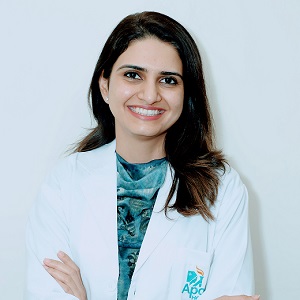Fetal medicine is a recent advance in the management of high-risk pregnancies, fetal abnormalities and complications occurring during and after delivery of the baby. Specialised Fetal medicine experts are involved, along with Obstetricians and Gynaecologists.
About Fetal medicine
Fetal medicine is a broad spectrum of a specialised field offering screening, diagnosis, management and prevention concerning a growing fetus.
- Screening: Investigations like Ultrasonography, blood analysis, and vital screening are done before conception, during early, mid and late stages of pregnancy, and during and after delivery to detect disorders in the mother and developmental anomalies in the growing fetus.
- Diagnosis: Early screening helps the obstetrician and Gynaecologist to diagnose fetal anomalies and refer the mother to a fetal medicine specialist.
- Management: Treatment is initiated once the diagnosis is confirmed in the form of medicine, minimally invasive surgeries, open fetal surgeries and or counselling of parents.
- Prevention: Early fetal medicine may help prevent long-term illnesses and disabilities like bone growth disorders, nerve injuries, developmental delays, preterm delivery, etc.
Who qualifies for Fetal medicine?
- Pre-existing medical conditions
Females having pre-existing medical conditions like diabetes, high blood pressure, thyroid disorders, anaemia, Kidney diseases, Lupus or skin disorders will be termed as high-risk pregnancies and will be regularly monitored in the fetal medicine unit.
- Genetic disorders
Some individuals are predisposed to a certain genetic chromosomal abnormality like sickle cell anaemia, Cystic fibrosis, Spinal Muscular Atrophy(SMA), etc., requiring extensive counselling and screening before and after conception.
- Pre-eclampsia
Pre-eclampsia is high blood pressure or hypertension developed by the expectant mother during pregnancy. This may pose a risk to the growing fetus requiring management of blood pressure and monitoring of the fetus.
- Multiple fetuses
Multiple fetuses during a single pregnancy or twins, triplets or quadruplets increase the chance of the mother having pre-eclampsia and pre-term labour and delivery. Such high-risk pregnancies need counselling of the parents for possible complications during delivery and future pregnancies.
- Sexually transmitted diseases
Women suffering from sexually transmitted diseases like Herpes, Gonorrhea, etc. have an increased chance of infecting their fetus through the placenta. Once the infection is detected in ultrasound and blood tests, the fetus may be administered medications and require close monitoring in the fetal medicine unit.
- Obesity
Obese women or excessive weight gain during pregnancy may predispose the mother to pre-eclampsia, diabetes, renal disorders, fetal abnormalities and pre-term labour and delivery. Obstetricians will refer such pregnancies to fetal medicine specialists.
If you or your loved ones are undergoing such a high-risk pregnancy, it is recommended to consult a fetal medicine specialist with proper guidance from your obstetrician.
Understanding the benefits of Fetal medicine
- Specialised and personalised care for mother and growing baby
- The survival rate of mother and fetus in a high-risk pregnancy improves significantly.
- The specific needs of the growing fetus will be taken care of at the right time by fetal medicine specialists.
- Screening and counselling of expectant parents greatly help in managing fetal abnormalities.
- Continual Monitoring of a high-risk as well as a low-risk pregnancy helps avert long-term issues with childbearing.
What are the risks and/or Complications of Fetal medicine?
- Adverse events are rare for the mother when the fetus is given medications through the transplacental route.
- Minimally invasive surgeries carry a 1-5% risk for the mother which will be taken care of by your obstetrician and Fetal medicine specialist.
- Open fetal surgeries during pregnancy may also be a risk for the mother leading to uterine ruptures, pulmonary oedema, scar on the fetus may get infected, etc.
Conclusion
Fetal medicine is a newly introduced broad-spectrum unit that covers all aspects of mother and fetus screening, diagnosis of abnormalities, managing high-risk pregnancies and fetal abnormalities, along preventive measures to ensure timely treatment of long-term illnesses. The survival rate of mother and child improves, thus causing fruitful childbearing for parents and caregivers.
Request an appointment at Apollo Cradle, Amritsar - Abadi Court Road. Call 1860-500-4424 to book an appointment.
The growing fetus is at the greatest risk of developing abnormalities during the first trimester or first three months of pregnancy. This can be due to physical and internal risk factors transmitted from the mother to the fetus.
According to guidelines, there are two scans done, first between 11-14 weeks of pregnancy, known as an early fetal scan, and the second during 18-21 weeks of pregnancy, termed as fetal anomaly scan
Single or multiple sessions of ultrasound scans does not cause any harm to the growing fetus and is considered the safest way to detect fetal growth and developmental anomalies.
Our Doctors
Treatments
- Blood Tests
- Down's Syndrome Screening
- Early Anomaly Scan
- Fetal Anomaly Scan
- Fetal Echocardiography Scan
- Fetal Ultrasound
- Fetal Well-Being Scans With Fetal Doppler
- Nuchal Translucency (NT Scan)
- Pre-eclampsia Screening
- Pre-Natal Screening & Test
- Screen For Maternal Infections
- Surveillance And Monitoring Of Twin Pregnancies
- Tests For Thalassemia And Sickle Cell Disease
- Viability Scan

 94% Patient Satisfaction Score
94% Patient Satisfaction Score



